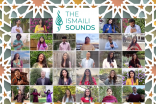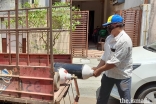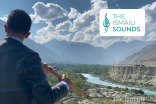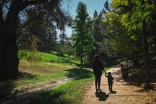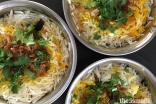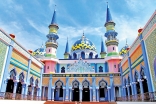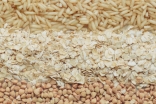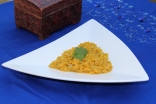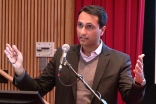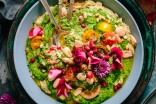Content Tagged with app
The Ismaili is pleased to present a specially commissioned music video entitled Tere Liye (For You). Performed in six languages and featuring over a hundred The Ismaili Sounds artists, the song celebrates the tireless efforts of the countless volunteers who have supported The Ismaili TV since its launch and acknowledges all volunteers who have helped the Jamat feel connected, supported, and entertained during the Covid-19 pandemic.
The Covid-19 pandemic remains a serious public health concern across the globe. International attention is currently focused on the alarming situation in India, as many other countries around the world confront and prepare for second and third waves of infection.
The Ismaili is pleased to present Ameen - A Global Prayer of Hope featuring 25 instrumentalists and singers from around the world. The song conveys a prayer of hope for the global Jamat.
With technology advancing and the world becoming increasingly globalised, the very nature of healthcare provision is changing. Young Ismailis around the world are at the forefront of this transition, pursuing diverse interests to help health workers around the world provide equitable, compassionate, and quality care.
Health can be defined as a state of physical and mental wellbeing. While there are many ways to achieve this state, sport is a globally recognised medium that facilitates healthy lifestyles. Created in 2020, The Sportshow is a series on The Ismaili TV that promotes dialogue with Ismaili talent in the field of sport worldwide. Based on the show, here are the unique stories of three accomplished, skilled, and inspiring Ismaili athletes.
As countries worldwide have been dealing with the problems of the Covid-19 pandemic, it can be difficult to imagine anything worse than communicable or infectious diseases. However in reality, today we are facing the dual burden of communicable and non-communicable diseases (NCDs).
In this interview with The Ismaili, Azmina Govindji discusses nutrition and healthy eating for better physical and mental health, and shares advice on how to adjust lifestyle choices to enjoy a better quality of life.
This week, The Ismaili is pleased to present the naat Mere Dil Mein Hai Yaad-e-Muhammad. Naats are songs or poems expressing devotion to the Prophet Muhammad (may peace be upon him and his family), and are commonly performed in some parts of the Muslim world during the month of Ramadan.
Humans are not only made to move — it is essential to our survival. The World Health Organization attributes over 3 million deaths each year to insufficient physical activity. The more we move, the more we boost the health of our bodies and minds, and the more alive we feel. Walking is one of the simplest ways to stay active.
Ismailis from different parts of the world have stepped up to support their communities and help each other maintain their health and overall wellbeing during the pandemic.
Are you curious to learn more about Islamic history, culture, and societies? The Institute of Ismaili Studies (IIS) publishes a wide range of books that explore some of the diverse manifestations of Islam. This guide, in celebration of World Book Day, suggests a few good places to start.
One year ago, The Ismaili launched an online TV channel, supported almost entirely by a team of dedicated volunteers, in an effort to fill the void that the pandemic left in the lives of the global Jamat.
Grains are a basic food in households around the world and can be broken down into two categories: whole grains and refined grains. Unlike the refined grain, the whole grain kernel or the seed has all three parts intact: the bran, germ, and endosperm. Each one of these parts offer health promoting benefits. The bran, which is the outermost layer, contains the fibre, B vitamins, iron, copper, zinc, magnesium, and antioxidants. The germ is the centre most part of the seed and it is loaded with healthy fats, vitamin E, B vitamins, phytochemicals, and antioxidants. The endosperm is the innermost layer that holds the carbohydrates, protein, and small amounts of B vitamins.
Ever wonder why our parents tell us to drink milk with turmeric and saffron when we are fighting a cold? Or why so many diverse spices are added to our foods to add flavour and more? Our cultural foods — whether from Central Asia, South Asia, or the Middle East — have a beautiful history, but they can also be perceived as unhealthy. While some dishes do indeed cause concern, many are healthy or can be made healthy with some simple tweaks.
If scrolling through social media sites such as LinkedIn makes you feel overwhelmed or unaccomplished in comparison to others — you're not alone.
Covid-19 has changed much of what we do and how we do it; from shaking hands and hugging our friends, to the very way we learn and work with our peers and colleagues. At the same time, Covid-19 has given rise to CONNECT, an initiative of Global Encounters and Aga Khan Youth and Sports Boards from around the world. Taking the form of a virtual camp, CONNECT is a way for Ismaili students to build bonds no matter where they may come from. CONNECT will be returning this summer from 19-25 July and 2-8 August.
This week, on our sixth episode of Trailblazers, we are joined by Dr Eboo Patel, the founder and president of Interfaith Youth Core (IFYC), a nonprofit organisation based in Chicago that prepares youth to become interfaith leaders in a changing environment. Eboo was also a member of President Barack Obama’s inaugural advisory council on faith-based and neighborhood partnerships. A Rhodes scholar with a doctorate in sociology from Oxford University, Eboo has authored four books, with a fifth on the way. In recognition of his life’s work, Eboo has also been awarded numerous honorary degrees.
Building a fairer, healthier world is the theme for this year’s World Health Day, recognized annually by the World Health Organization on 7 April.
Healthy living is a difficult state to achieve at the best of times. How can we create and sustain good health, whilst facing an unprecedented public health challenge which has left a trail of economic and social upheaval?
In order to improve their performance, organisations often hire the services of management consultants. But what exactly is a management consultant, and what do they do?


